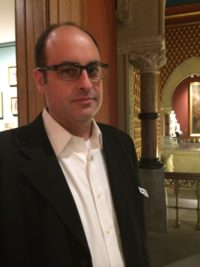A nation must think before it acts.
VENUE:The Armory at the First Troop Philadelphia City Cavalry
Looming Over the Horizon: Three Perspectives on the Biggest Threats to National Security
About the Event
Sponsored by BNY Mellon Wealth Management

Fourteen years after the 9/11 attacks the world remains a dangerous place. Moving forward, however, what will be the biggest threats to U.S. national security? Will threats posed by terrorists, transnational criminal enterprises, and hackers be the greatest threats or will they be posed by other nations such as China and Russia? To answer these questions and more, we have asked Drs. Michael Boyle, Michael Horowitz, and Michael Noonan to address what they see as the three biggest threats to U.S. national security.
 Michael Boyle is an Associate Professor of Political Science at La Salle University in Philadelphia and a Senior Fellow with the Foreign Policy Research Institute. He was formerly a Lecturer in International Relations and Research Fellow at the Centre for the Study of Terrorism and Political Violence at the University of St. Andrews in Scotland. His research mainly focuses on political violence, terrorism, insurgencies, drone warfare and American foreign policy. He has been a consultant for the U.S. and UK governments and was a counterterrorism advisor to the Obama campaign in 2007-2008. He holds an M.Phil and a Ph.D. in International Relations from Cambridge University, an MPP from Harvard University and a BA in political science from La Salle University. He has held fellowships at the Center for International Security and Cooperation at Stanford and the Belfer Center for Science and International Affairs at Harvard. He was also a Fulbright fellow at the Australian National University in Canberra. His most recent book is Violence after War: Explaining Instability in Post-Conflict States (Baltimore: Johns Hopkins Press, 2014).
Michael Boyle is an Associate Professor of Political Science at La Salle University in Philadelphia and a Senior Fellow with the Foreign Policy Research Institute. He was formerly a Lecturer in International Relations and Research Fellow at the Centre for the Study of Terrorism and Political Violence at the University of St. Andrews in Scotland. His research mainly focuses on political violence, terrorism, insurgencies, drone warfare and American foreign policy. He has been a consultant for the U.S. and UK governments and was a counterterrorism advisor to the Obama campaign in 2007-2008. He holds an M.Phil and a Ph.D. in International Relations from Cambridge University, an MPP from Harvard University and a BA in political science from La Salle University. He has held fellowships at the Center for International Security and Cooperation at Stanford and the Belfer Center for Science and International Affairs at Harvard. He was also a Fulbright fellow at the Australian National University in Canberra. His most recent book is Violence after War: Explaining Instability in Post-Conflict States (Baltimore: Johns Hopkins Press, 2014).
 Michael Horowitz is an associate professor of political science at the University of Pennsylvania and a senior fellow at the Foreign Policy Research Institute. His research focuses primarily on international conflict and military innovation by state and non-state actors. He is also interested in the intersection of religion and international relations, the role of leaders in international politics, and international security issues in East Asia. His first book, The Diffusion of Military Power: Causes and Consequences for International Politics was recently published by Princeton University Press. He has held fellowships at the Olin Institute for Strategic Studies at Harvard, the Belfer Center for Science and International Affairs at Harvard, and the Weatherhead Center for International Affairs at Harvard. His work has been published in International Organization, International Security, the Journal of Conflict Resolution, the Washington Quarterly, Orbis, and elsewhere. He received his PhD in government from Harvard University and his BA in political science from Emory University.
Michael Horowitz is an associate professor of political science at the University of Pennsylvania and a senior fellow at the Foreign Policy Research Institute. His research focuses primarily on international conflict and military innovation by state and non-state actors. He is also interested in the intersection of religion and international relations, the role of leaders in international politics, and international security issues in East Asia. His first book, The Diffusion of Military Power: Causes and Consequences for International Politics was recently published by Princeton University Press. He has held fellowships at the Olin Institute for Strategic Studies at Harvard, the Belfer Center for Science and International Affairs at Harvard, and the Weatherhead Center for International Affairs at Harvard. His work has been published in International Organization, International Security, the Journal of Conflict Resolution, the Washington Quarterly, Orbis, and elsewhere. He received his PhD in government from Harvard University and his BA in political science from Emory University.
Michael P. Noonan is the Director of Research, and is the Director of the Program on National Security, at the Foreign Policy Research Institute. His current research focuses on civil-military relations, indirect approaches and strategy (particularly as they relate to political and irregular warfare), the roles and missions of the U.S. military, and transnational foreign fighters. A former Captain in the U.S. Army Reserve, in 2006- 2007 he served on a Military Transition Team (MiTT) with an Iraqi light infantry battalion in and around the northern city of Tal`Afar. Among other professional affiliations, he is a member of the International Institute for Strategic Studies, a fellow of the Inter-University Seminar on Armed Forces and Society, a life member of the Veterans of Foreign Wars, and has consulted for the Institute for Defense Analyses. He holds a PhD in political science from Loyola University Chicago and is also a graduate of the University of Scranton and Creighton University. Dr. Noonan has taught at Loyola University Chicago and Haverford College. His writings have appeared in The American Interest, Orbis, Parameters, National Security Studies Quarterly, and FPRI E-Notes. He is the editor of, and contributor to, Geopoliticus: The FPRI Blog and also blogs at the U.S. News and World Report’s World Report and at War on the Rocks.
Venue
The Armory at the First Troop Philadelphia City Cavalry
22 South 23rd Street
Philadelphia. PA. US. 19103
Registration
This event is free and geared to professionals and students under the age of 50.
Reservations are required. RSVP: events@fpri.org
For more information contact 215 732 3774, ext 200 or events@fpri.org.
Speakers

Michael J. Boyle - Dr. Michael J. Boyle is an Associate Professor of Political Science at La Salle University in Philadelphia and a Senior Fellow with the Foreign Policy Research Institute.

Michael Horowitz - Michael Horowitz is professor of political science at the University of Pennsylvania and a senior fellow at the Foreign Policy Research Institute.

Michael P. Noonan - Dr. Michael P. Noonan is a Senior Fellow at the Foreign Policy Research Institute. He is a veteran of Operation Iraqi Freedom.




